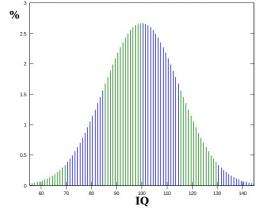The IQs of a large enough population are calculated so that they conform to a normal distribution with a mean of 100 and a standard deviation of 15. Image: Wikipedia.
Is there a link between differences in IQ test performance and the activity of certain genes? Researchers from Charité - Universitätsmedizin Berlin have shown that modifications in the structure of a specific gene have a negative impact on individual test performance. This suggests that environmentally induced epigenetic changes to our genetic material have a greater impact on intelligence than previously thought. Results from this study have been published in Translational Psychiatry.
Stress and adverse life experiences are examples of environmental factors that can affect gene activity, leading to structural changes in our genetic material (genome). These epigenetic changes enable the human genome to adapt to its environment, allowing our DNA to be passed on to the next generation of cells, as well as passing on the information that determines whether, and under which conditions, a particular gene will be activated.
This study was led by Dr. Jakob Kaminski and Prof. Dr. Andreas Heinz of Charité's Department of Psychiatry and Psychotherapy on Campus Charité Mitte. The international team of researchers compared the IQ test results of close to 1,500 adolescents with epigenetic modifications. The study focused on testing genes that are important in dopamine-based signal transmission (dopamine neurotransmission). Dopamine plays an important role in the brain's reward system and is crucial in modulating a person's drive and motivation. The researchers were able to demonstrate a link between the epigenetic regulation of dopamine neurotransmission and an individual's IQ test performance. Epigenetic modification resulted in silencing the dopamine receptor gene; neurons carried fewer dopamine receptors, and signal transmission was reduced. In this current study, silencing of the gene was associated with lower IQ test results.
Commenting on the results of the study, Dr. Kaminski explains, "We have previously been able to observe links between stress and cognitive performance, particularly in relation to the activity of the dopamine-controlled reward system. Environmentally induced gene activity now joins the ranks of other factors known to influence IQ test performance, such as poverty and genetic constitution. In this study, we were able to observe how individual differences in IQ test results are linked to both epigenetic changes and differences in brain activity which underlie environmental influences." The researchers are hoping to conduct more in-depth studies to determine the extent of environmentally-induced neurobiological modifications, as well as the degree to which these modifications affect IQ test performance.
More information: Epigenetic variance in dopamine D2 receptor: a marker of IQ malleability?, Translational Psychiatry (2018). DOI: 10.1038/s41398-018-0222-7
Journal information: Translational Psychiatry
Provided by Charité - Universitätsmedizin Berlin


.jpg)



















